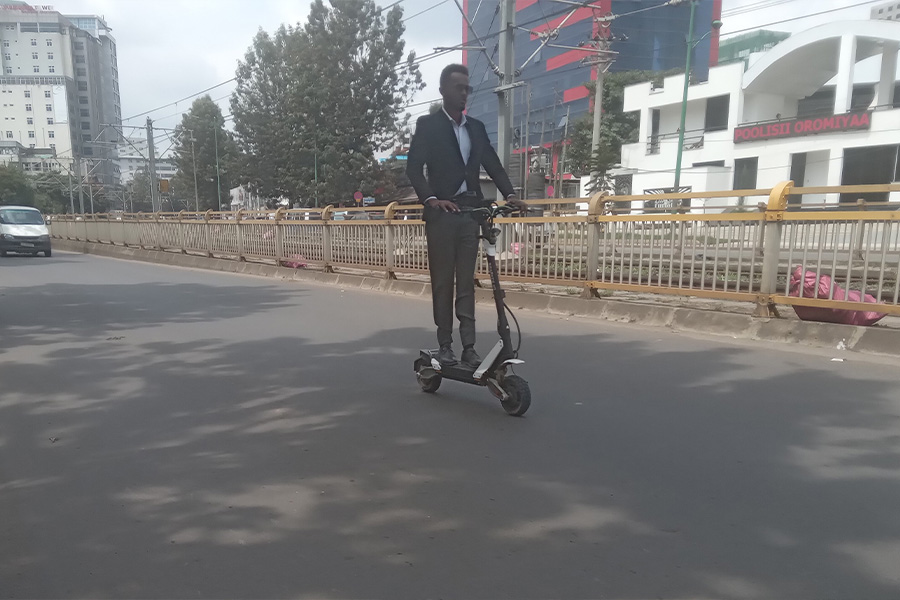
Films Review | Dec 05,2018
Jul 13 , 2024
By Kidist Yidnekachew
I work three days a week for a half-day shift. Although it is a job that I love, the long commute from home is exhausting. There have been times when I have fallen asleep in the taxi. By the time I get to work, all I want to do is eat and rest. Thankfully, my job is engaging, which helps me to push through.
For those who work six days a week to make ends meet, a long commute takes a toll on their productivity. Some people may have the luxury to drive or use a taxi-hailing service, while most of the workforce relies on public transportation. However, taking public transport for long commutes is tiring and stressful. Standing in crowded buses or trains during rush hour leaves people feeling drained, making it harder to stay focused and alert when they arrive at work. After spending two to three hours stuck in traffic every day, who has the energy to spend time with their family?
A study published in the journal, Transportation Research Part F: Traffic Psychology and Behaviour, has shown that traffic congestion, delays, and overcrowding observed in long commutes can increase stress levels, often reflected in elevated cortisol levels. This chronic stress can hurt decision-making, creativity, and overall well-being, ultimately affecting job performance.
It is sad to see how many people work so hard just to survive, only to keep toiling until their last breath. Employers should offer flexible working hours to accommodate those with long commutes. Reducing the pressure of peak-hour travel can be achieved with remote work options as well.
On a personal level, individuals should explore strategies to manage commuting stress. Practicing mindfulness during the commute, such as through meditation or deep-breathing exercises, can help maintain a calm and positive mindset. Engaging in enjoyable activities, like reading or listening to music or podcasts, can also make the commute more bearable.
The concept of commuting as a mental decompression period is more bearable with efficient public transportation systems and a cultural emphasis on work-life balance. While specific experiences and attitudes can vary, countries like Germany, Sweden, France, and Japan, with organized and reliable trains, buses, and trams, generally recognize the benefits of using commuting time to transition between personal and professional roles.
I strongly believe there should be a limit on the number of passengers allowed on buses and trains. It perplexes me why such regulations only pertain to taxis, as no matter how crowded a taxi may be, there always seems to be some breathing space. Unfortunately, this cannot be said for buses.
Walking along scenic paths and walkways, I contemplate the government's efforts to encourage walking and cycling instead of driving. It does not seem as appealing as it sounds, picturing arriving at a workplace sweaty after a long walk, only to find that my lunchbox has leaked inside my bag. Cycling presents its own short-term challenges, as many people are not proficient in biking.
Investing in better public transportation infrastructure can improve the overall commuting experience, making it more efficient and less stressful for everyone involved.
PUBLISHED ON
Jul 13,2024 [ VOL
25 , NO
1263]


Films Review | Dec 05,2018

Life Matters | Aug 27,2022

Life Matters | Dec 14,2019

View From Arada | Mar 13,2021

Radar | Aug 18,2024

My Opinion | Jun 29,2019

In-Picture | Oct 12,2024

Radar | Aug 17,2025

View From Arada | Jul 20,2024

Radar | Oct 19,2019

Photo Gallery | 179968 Views | May 06,2019

Photo Gallery | 170165 Views | Apr 26,2019

Photo Gallery | 161163 Views | Oct 06,2021

My Opinion | 137236 Views | Aug 14,2021

Dec 22 , 2024 . By TIZITA SHEWAFERAW
Charged with transforming colossal state-owned enterprises into modern and competitiv...

Aug 18 , 2024 . By AKSAH ITALO
Although predictable Yonas Zerihun's job in the ride-hailing service is not immune to...

Jul 28 , 2024 . By TIZITA SHEWAFERAW
Unhabitual, perhaps too many, Samuel Gebreyohannes, 38, used to occasionally enjoy a couple of beers at breakfast. However, he recently swit...

Jul 13 , 2024 . By AKSAH ITALO
Investors who rely on tractors, trucks, and field vehicles for commuting, transporting commodities, and f...

Nov 1 , 2025
The National Bank of Ethiopia (NBE) issued a statement two weeks ago that appeared to...

Oct 25 , 2025
The regulatory machinery is on overdrive. In only two years, no fewer than 35 new pro...

Oct 18 , 2025
The political establishment, notably the ruling party and its top brass, has become p...

Oct 11 , 2025
Ladislas Farago, a roving Associated Press (AP) correspondent, arrived in Ethiopia in...

Nov 2 , 2025
The National Bank of Ethiopia (NBE) has scrapped the credit-growth ceiling that had s...

Nov 2 , 2025 . By SURAFEL MULUGETA
The burgeoning data mining industry is struggling with mounting concerns following th...

Nov 2 , 2025 . By YITBAREK GETACHEW
Berhan Bank has chosen a different route in its pursuit of a new headquarters, opting for a transitional building instea...

Nov 2 , 2025 . By BEZAWIT HULUAGER
Nib International Bank S.C. has found itself at the epicentre of a severe governance...